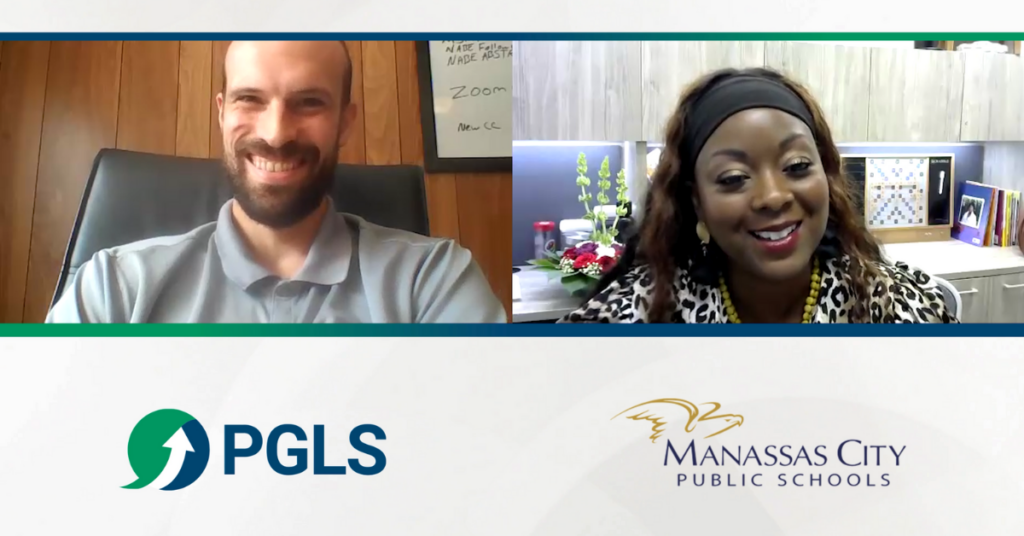The Language Access Lectern | a PGLS Podcast | Episode 1
Multilingual learners (MLs) are the fastest-growing student population in the United States. Educators, administrators, language access professionals, and community leaders have a responsibility to ensure that every student, regardless of their linguistic and cultural background, has equal access to educational resources and opportunities.
For the inaugural episode of The Language Access Lectern, host Mark Byrne speaks with Almeta Radford, the director of public communications at Manassas City Public Schools. Almeta is not only a champion for language access but also co-hosts the podcast “Riding with the Radfords.”
Listen to the episode here. Read on for a few of the most insightful takeaways from Mark and Almeta’s conversation, including the unique strategies Manassas City Public Schools employs to foster inclusive environments for multilingual and EL students.
Why Language Access Matters in K-12 Schools
Mark: We recently convened at the Language Access Symposium, which brought together a unique mix of school districts and language access champions. Each has different resources and budgets and approaches their language access programs differently. Almeta, what were some of your impressions and takeaways from the event?
Almeta: It was nice to hear everybody be open about not only their triumphs where they have been able to help families but also their challenges. Sometimes, you feel like there are people out there who are in a “perfection state,” but maybe they are having a hard time meeting all of the demands and needs just the same way that we are, even at a smaller level. My takeaway was that you’re just like me. These other administrators and educators have a lot of the same challenges and responsibilities, and they want to make a difference in the same way we do.
Mark: In your words, why is K-12 language access planning so important?
Almeta: Achievement gaps exist all across the country in ML populations. This problem is not unique to any one of these schools within the DMV; it’s widespread. Plenty of data out there talks about the impact of parent and student engagement on student growth. The more engagement and parental participation in their student’s education progress, the more we can move numbers related to student growth.
How School Districts Can Support EL Students and Families
Mark: As you mentioned earlier in our discussion, EL students are now the fastest-growing segment in the United States.
Almeta: Manassas City Public Schools, like many others, has seen a growing demand for language services to meet the needs of their diverse student body. This includes not only Spanish speakers but also families who speak other languages.
Mark: How is Manassas City Public Schools working to meet the needs of this student population?
Almeta: We definitely have grown in our need for language services, so I’m fortunate to have an interpreter and translator in the central office. We have one person in my department and dedicated Spanish interpreters in each of our nine locations. As for supporting families who speak other languages, that’s where PGLS comes in to help us with interpreting and translation support.
How Can K-12 Language Access Managers Advocate for Resources?
Mark: You mentioned working in K-12 schools for 26 years. What advice do you have for fellow language access managers, educators, and administrators passionate about helping EL students succeed?
Almeta: I had the opportunity to connect with several other K-12 language access managers at the Language Access Symposium, and one topic that came up frequently was budget. One administrator noted she was scared to go into the room and ask for more budget. I sit on the cabinet with our superintendent and others, and I frequently make that budget ask in those meetings. I told her that we needed to get them excited about our impact. Look how many of our families receive the information they need. She said she had never thought about it that way. It’s about empowering those people in the room to connect with your story.
A Call to Action for Educators and Administrators
Mark: What do you want our listeners to learn from your experience working with EL families and students?
Almeta: Helping parents understand their rights for interpretation services is an incredibly important theme all across the country. Some states do better than others in letting parents know about their rights. One thing that I hope other school leaders take away from that conversation is that we all have a great opportunity to be advocates for those multilingual families in our community.
